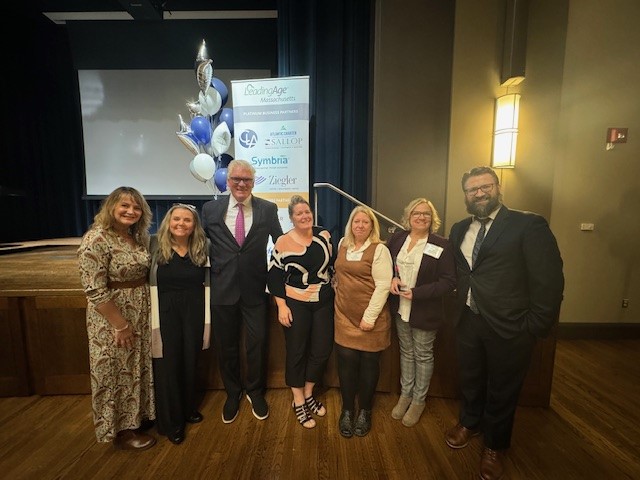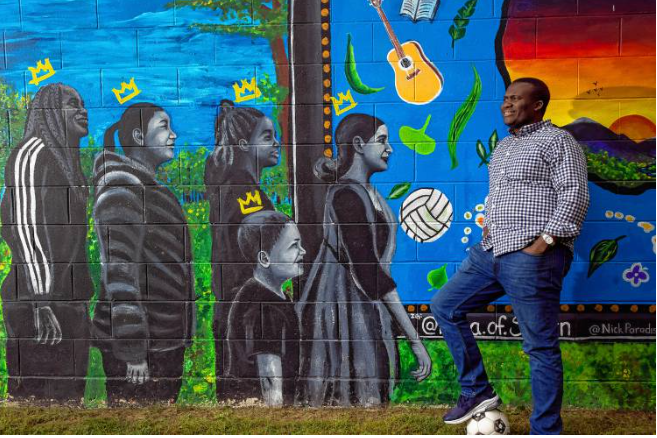Mentoring, friendship and inclusion keys to success for refugees
February 12, 2020 Laconia Daily Sun
LACONIA – When Albertine D’Almeida arrived in the United States at age four, the refugee from Ghana experienced two kinds of shock. First, the January air in Boston seemed preposterously cold. “I woke up and started crying,” said D’Almeida, now a sophomore at Laconia High School. Her second discovery was more jarring.
The greeter from Lutheran Social Services who met her family at the airport was friendly, but to Albertine, she looked terribly ill. Her skin was colorless. Albertine’s fear soared when she entered the airport and surveyed a landscape of people with pale, translucent skin. “I thought they were sick and could give it to me,” she said.
Weeks later her trepidation faded when she met Carol Corrigan, a member of First Congregational Church of Hopkinton, who had a heart for refugees and wanted to get to know the D’Almeida family personally. She became their guide, problem-solver and friend. Over the next 12 years, Albertine, now 16 and Carol, now 73, forged a bond that transcended culture, native language and race.
“She’s like my grandma,” D’Almeida said. “She comes to my basketball games. I still have sleepovers at her house. She’s been our family’s savior. She’s been helping us with everything we need. We include her as part of our family.”
“I just gravitated toward them,” said Corrigan, who took the D’Almeidas grocery shopping, helped them fill out government forms, and accompanied the children on school field trips. She also took them to the movies and the beach, to Canobie Lake Park, Water Country, the Christa McAuliffe Planetarium, Polar Caves and Franconia Notch. “I would stop in and see what their needs were. I don’t know that other (refugees) have a family here that can always be there.”
It’s the kind of enduring relationship – a blend of caring, reliability and connectedness – that breeds success for new arrivals who land with few possessions outside of hope. Mentoring and authentic friendships in schools and communities and at work are critical foundations for assimilation, along with jobs that are stepping stones to independence.
“Refugees are not looking for a handout. They’re looking for an opportunity to live safely and in freedom,” said Amy Marchildon, director of Services for New Americans at Ascentria Care Alliance in Concord, one of two major agencies in New Hampshire that serve refugees.
“It’s as if you move into a new place, after traveling across the country with just a suitcase,” said Kate Bruchakova, an immigrant from Slovakia who is now community health educator at the Partnership for Public Health in Laconia. Refugees “are looking for a friendly place with jobs, a reasonable cost of living, and feeling like they belong,” she said. “Most beneficial to newcomers is to have a mentor and a friend.”
This year, fewer than 100 refugees are expected to be resettled in New Hampshire, down from 162 between July 2017 and 2018, and 518 two years earlier, according to the N.H. Department of Health and Human Services, which oversees resettlement in the state. In compliance with a limit set by President Donald Trump, up to 18,000 refugees will be relocated across the U.S. this year, mostly in California, New York, Texas and Washington. It’s a drop from 53,000 in 2012. The second-largest resettler of refugees has historically been Australia, which took in just over 5,000 refugees in 2012, according to data cited by the New Hampshire Children’s Behavioral Health – Workforce Development Network.
Since Nov. 1, 37 refugees have been resettled in New Hampshire, compared to four in Vermont, 14 in Maine and 92 in Massachusetts, according to the U.S. State Department’s Refugee Processing Center. It’s unknown how many will come to Nashua, Manchester and Concord, the three cities designated as welcoming. There, newcomers find ample entry-level jobs, public transportation, available affordable housing, translators at hospitals and primary care clinics, and a network of social services to support their transition to financial self-sufficiency. Laconia was a resettlement site eight years ago, but without these advantages of larger cities, it’s no longer considered viable.
Refugees locate in service hubs
Forty years ago, the Refugee Act of 1980 created the Federal Refugee Resettlement Program, whose mission is to help them become economically self-sufficient as soon as possible after arriving in the U.S. In New Hampshire, refugee resettlement began in the late 1990s in 22 communities across this state. Laconia’s first arrivals – four Bosnians and Croatians from the former Yugoslavia – came between 1997 and 1998; the last group was settled in 2012, and included former Yugoslavians and Meskhetian Turks.
The D’Almeida family arrived in 2008, living first in an apartment in Penacook before buying a house in Laconia last year.
Albertine said it’s been a slow and tepid transition, moving from Concord High and Concord, which are more diverse, with more opportunities for friendly interaction and forming bonds with other immigrants, including on school sports teams she felt more comfortable joining.
“Everybody here stays to themselves,” she said of Laconia. “I don’t want to say everyone is selfish or anything, but I think it’s difficult for people to open up and see through differences. I can count two people in my school who look like me. One is my friend.”
Her father commutes daily to work as a sheet metal fabricator in Boston; her older brother drives to his job at a car rental company in Concord.
Today, compared to the state’s larger commercial hubs – and to Laconia 10 years ago – there are fewer good-paying, full-time jobs, and no easy way to get to them if you don’t own a car. There’s also a critical shortage of housing for beginning workers who are starting out, especially those who aren’t skilled and don’t speak English fluently, according to housing and refugee specialists.
In 2009, Freudenberg NOK closed its automotive component plants in Laconia and Franklin, eliminating a major source of year-round work and over 300 local manufacturing jobs, including many at entry level. In 2017, after more than 12 years running, Winnipesaukee Transit Authority ended local bus service, citing lack of funding from surrounding towns. Without public transportation, many seniors, low-income residents and refugees found themselves rideless.
Today, Laconia boasts committed volunteers, including a Human Relations Committee eager to welcome new Americans. It also features model English language training programs in schools, and adult education, according to experts in public health. But it lacks a seminal ingredient for refugee well-being: a critical mass of foreign-born people who share a language, customs, religion and the experience of being new. Laconia is also 45 to 60 minutes by car from the state’s main refugee resettlement coordinators: International Institute of New England in Manchester and Ascentria in Concord – too far for easy service, according to support providers.
Since Laconia welcomed 15 Bhutanese refugees in 2008, nearly all have relocated to North Carolina or Ohio, where housing is cheaper and a network of jobs permits advancement. Another plus: thriving communities of Bhutanese, including friends and relatives.
Welcoming communities are places where “neighbors and community members are well informed and have accurate information about the newcomers, and can extend themselves in neighborly ways,” said Barbara Seebart, New Hampshire State Refugee Coordinator at the New Hampshire Department of Health and Human Services. “Welcoming is not just being neighborly. It also means setting up structures that help people move forward” to self-reliance and fulfilling lives.
Resistance to refugees lingers
In Laconia, in the recent past, residents have expressed mixed feelings about taking in refugees – as well as misunderstandings about what welcoming means. When the Laconia Human Relations Committee provided signs proclaiming “Everybody is Welcome in Laconia” for 15-20 residents to display on their lawns last summer, the message sparked impassioned expressions of solidarity and resistance, said Carol Pierce, a founding member of the committee, which was started 20 years ago.
In 2018, a citizens group concerned about Islamic doctrine and the potential for pockets of sharia law here came to tape the committee’s meeting at Laconia City Hall, making some members uncomfortable. “For a few meetings, when they were here, we didn’t want to talk,” said Pierce. Since then, the taping and discomfort has stopped, and the meetings currently feel open and tolerant, she said.
During this fall’s mayoral race, some people expressed fears about the prospect of Laconia becoming a sanctuary city – a designation with multiple meanings, including places where local law enforcement officers are directed not to cooperate with federal immigration officials. That prospect, however remote, became a rallying cry. It prompted some residents to endorse Peter Spanos over Andrew Hosmer, the city’s new mayor, who also declared his opposition to Laconia becoming a sanctuary city, and called it a baseless concern.
The process
To emigrate to the U.S., refugees undergo a lengthy vetting and application process coordinated by the U.S. State Department, and many have waited years in refugee camps in areas where they wouldn’t survive outside the camps. In contrast, legal immigrants enter through a rigorous and time-consuming immigration process that is also defined by annual quotas. They are not relocated for safety.
Ali Sekou, a former security guard at the U.S. Embassy in Niger, emigrated here in 2012. He said he lived happily in Laconia and made lasting friendships with people he still visits weekly. But in December, before his wife came from Niger to join him, Sekou moved to an apartment in Concord. There, he is closer to his job as an assistant store manager at a Hannaford supermarket in Derry, and the Sekous have a community of other immigrants from African countries, as well as a mosque for worship.
“America is a land of opportunity and it’s very peaceful,” Sekou said. But it’s important to bridge the gap between natives and immigrants, African and American, black and white, he said. “Only education can open people’s minds and make them accept each other and work as a community.”
“It’s about a person feeling they’re sharing a sense of belonging with others,” said Bruchacova at the Partnership for Public Health. “Even in Concord, ethnic groups stick together. “The goal is to support them, but also help them build bridges with other community members.”
New Hampshire residents are generally friendly – and many proactively so; many fight intolerance and public displays of discrimination against people from other cultures, including new arrivals, said Marchildon at Ascentria.
In October 2015, when a Bhutanese refugee family in Concord held a permitted outdoor, week-long Hindu celebration, a neighbor who was annoyed by the noise and disruption painted, “Go home!” on a picture window facing the family’s house. “The family felt very unwelcome with the messaging that was directed at them,” Marchildon said. They apologized to their unhappy neighbor, and brought her a bouquet of flowers.
Community discussion circles were held to increase understanding and diffuse misunderstandings. But discontent spread on Facebook, “and quickly turned into racism and intolerance. That’s what happens all the time,” said Jessica Livingston, director of the Concord Multicultural Conference. “We are a welcoming city in general. For the most part there are very few public incidents, but it still happens under the surface.”
Livingston said recently what started as a social media post about graffiti under a local bridge quickly turned into ‘Those refugees’ and ‘Go back!’ “There’s not a lot of overt racism, but there’s a lot of implicit bias, and a lack of understanding around refugees,” she said, particularly in rural and northern parts of the state, where residents have less information and no interaction with refugees.
Today, Ascentria operates booths at multicultural festivals across New Hampshire and hosts library events and community discussions to sew understanding and compassion for refugees and the reasons they’re here. The causes of intolerance aren’t always obvious, Marchildon said, but can be rooted in racial and ethnic bias, passed down in families, and linked to a perceived vulnerability or a potential loss of Western culture and economic security.
When asked to welcome new Americans, “I think some people feel that something is being taken away from them. It’s not clear if that comes from a place of fear, or a sense that there aren’t enough resources to go around, and that someone is getting more than their fair share, or taking something away from someone else” – including a job or public benefits, Marchildon said.
Currently, federal refugee assistance coordinated by the U.S. State Department consists of a one-time, per-person payment of $975 to cover housing and food upon arrival (a boost of $200 is possible in some circumstances) – until food stamps can be started for a family or person arriving alone. According to federal regulations, each refugee receives a bed and chair, and one fork, spoon, knife and plate. Beyond that volunteers – historically through churches and other faith groups – provide for additional needs, such as toiletries, clothing and cookware. Ascentria locates housing with approved landlords and provides English language classes that can be coupled with on-the-job training. Financial support can last up to eight months. The agency also helps refugees obtain Social Security numbers so they can legally work and pay taxes.
Jim Thompson of Laconia, who is concerned about the potential cost to cities that host refugees, said taxpayers don’t always realize that public supports, such as food stamps or welfare, come out of local taxes. “Poor people that will have limited funding and temporary support can put a burden on local taxpayers, a burden that’s under the radar.”
Refugee advocates say the impact is exaggerated in voters’ minds. “People get hung up on the idea that this is a humanitarian program” offering support indefinitely,” Marchildon said. “What they don’t understand is that it’s an initial offer of support.” Refugees “are expected to become self-sufficient as soon as possible.”







